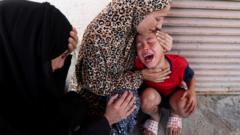The International Criminal Court (ICC) has reported alarming findings of war crimes in western Sudan, with a focus on targeted sexual violence against women tied to ethnic groups. As conflict rages between the Sudanese army and the Rapid Support Forces, the ICC cites over 12 million displaced individuals and widespread civilian suffering.
ICC Details Alarming War Crimes in Sudan Amidst Ongoing Conflict

ICC Details Alarming War Crimes in Sudan Amidst Ongoing Conflict
The International Criminal Court raises concerns over war crimes in Sudan, particularly targeting vulnerable populations amidst a spiraling humanitarian crisis.
The International Criminal Court (ICC) presented grave allegations of war crimes and crimes against humanity occurring in Sudan during a United Nations Security Council meeting on Thursday. The ICC reported "reasonable grounds" to believe that heinous acts, particularly targeted sexual violence against women and girls of specific ethnic groups, are unfolding in western Sudan, notably in the Darfur region.
Since the outbreak of conflict between the Sudanese army and the Rapid Support Forces (RSF) in April 2023, the UN has described the reality on the ground as resulting in devastating civilian casualties and further destabilization of the region. ICC Deputy Prosecutor Nazhat Shameem Khan outlined the scope of suffering, pointing to evidence from over 7,000 items collected from survivors who bravely provided testimonies despite the risks involved.
The UN Security Council had previously granted the ICC a mandate to investigate crimes in Darfur 20 years ago, prompting multiple inquiries into war crimes and genocide since July 2002. Following the renewed violence in 2023, the ICC has engaged with victims who fled to Chad, revealing a disturbing "inescapable pattern of offending." Khan emphasized that perpetrators in Darfur currently enjoy a sense of impunity but the ICC is committed to ensuring accountability for those responsible.
Allegations of genocide against the non-Arab population in the region had previously been made by the United States regarding the RSF and allied militias. The RSF denies these accusations, characterizing the conflict as a "tribal issue." Yet, reports from the UN indicate worsening conditions, with targeted attacks on hospitals and humanitarian convoys further exacerbating the crisis. Aid is being deliberately withheld from civilians, and the situation grows dire with incidents of sexual violence used as a weapon of war.
In the besieged city of el-Fasher, residents face isolation from critical aid, compounded by a cholera outbreak threatening water supplies. A UN agency has highlighted an escalating famine, stating that over 40,000 children suffered from severe acute malnutrition from January to May 2025, more than double the previous year. UNICEF's Sheldon Yett denounced the conflict's assault on children, emphasizing that they are being deprived of lifesaving aid.
The conflict's toll has been staggering, with more than 150,000 deaths reported and approximately 12 million individuals displaced since its inception. With no end in sight, Khan cautioned that the situation could still deteriorate further.




















